Growing up, it was always about them: 19 signs you may have been raised by a narcissistic mother or father. Learn to recognize the patterns!
Learning how to understand and make peace with your childhood is one of the most healing and empowering experiences you could ever go through.
As the son of a drug-addicted narcissistic mother and totally absent father, I know how important it is to come to terms with things narcissistic mothers say or their mental illness.
When we were children, we looked up to our parents for support, encouragement, nurturing and love.
But when we were denied these things, we developed a variety of beliefs, behavioral patterns, and coping mechanisms to help us survive in such a difficult environment. As adults, we often play out these same coping mechanisms, often to our own detriment.
The thing about being the child of a narcissistic mother and/or father is that it often contributes to something known in shamanic terminology as soul loss. Soul loss is the inability to contact or experience our souls due to the unresolved wounds, traumas, and fears we’ve accumulated over the years.
The first step in healing this soul loss is to be willing to explore what you went through as a child. This process of exploring the narcissistic actions of your parent isn’t done to condemn them or to victimize yourself.
Instead, this process is done to help you understand the root cause of any pain you’re still experiencing, to learn how to release it, and to move on with your life. This becomes a strengthening and rejuvenating process.
19 Signs You Had a Narcissistic Mother and/or Father
The thing about having a narcissistic mother and/or father is that you have been taught to believe that you are the crazy and imbalanced one, instead of them. This causes you to constantly doubt yourself and any feelings you have about them.
Another major sign of being raised by a narcissist is the constant guilt you struggle with. In other words, while you might suspect that there is something “off” with your parents, you feel ashamed to think about them in such a way, and you tend to start beating yourself up instead.
But there is a very good reason why you’ve come to this article. And while you may still have lingering doubts, I hope the following information can clear your mind.
Firstly, you should know that there are two main kinds of narcissists:
- Engulfing Narcissists — these are parents who see their children as extensions of themselves. In other words, engulfing narcissistic parents become obsessively involved in your life to an extreme extent. They don’t respect your boundaries or acknowledge you as a separate person.
- Ignoring Narcissists — these are parents who have very little interest in their children. Ignoring narcissists clearly see the boundary between themselves and their children. As a result, they neglect to take care of their children or show an active interest in their lives.
Related: How To Save Children From Narcissistic Abuse and Toxicity
Depending on what type of narcissistic parent you have, you’ll struggle with slightly different (but similar) issues.
So…
How does growing up with narcissistic parents feel like?
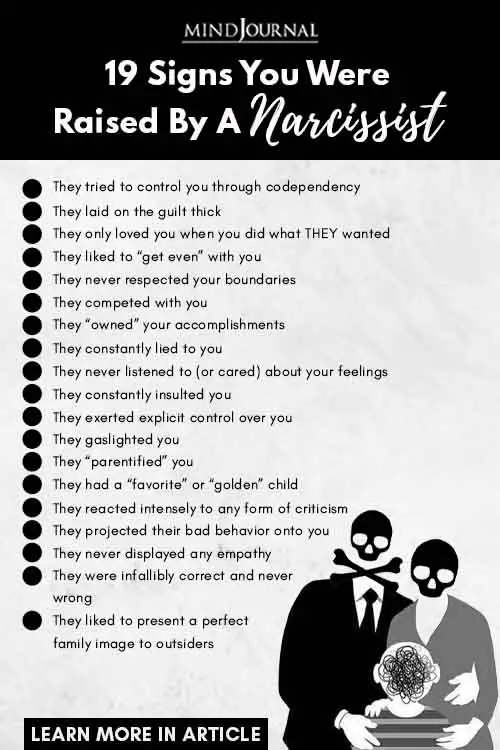
Here are some of the main narcissistic parent traits:
- They tried to control you through codependency
- They laid on the guilt thick
- They only loved you when you did what THEY wanted
- They liked to “get even” with you
- They never respected your boundaries
- They competed with you
- They “owned” your accomplishments
- They constantly lied to you
- They never listened to (or cared) about your feelings
- They constantly insulted you
- They exerted explicit control over you
- They gaslighted you
- They “parentified” you
- They had a “favorite” or “golden” child
- They reacted intensely to any form of criticism
- They projected their bad behavior onto you
- They never displayed any empathy
- They were infallibly correct and never wrong
- They liked to present a perfect family image to outsiders
Keep in mind that there’s a difference between narcissistic behavior (which only comes out every now and then) and narcissism. We all have a tendency to be narcissistic given the right circumstances (such as high stress). But narcissism is ongoing, chronic, and pathological.
I’ll go into these nineteen signs more in depth below:
Here are 19 major signs that you were raised by narcissistic parents
1. They tried to control you through codependency.
In other words, you were told by your parent/s, “Don’t leave me. I need you. I can’t live without you.” This made it impossible for you to live an autonomous life or establish independent priorities other than catering to the needs of your parent/s.
2. They laid on the guilt thick.
Another method of controlling you was to constantly guilt trip you into doing what they wanted. They may have told you, “I’ve done so much for you, I’ve sacrificed everything for you.” As a result, you felt indebted to them, and as though you “owed” them complete obedience.
Related: 10 Signs You Had An Abusive Parent
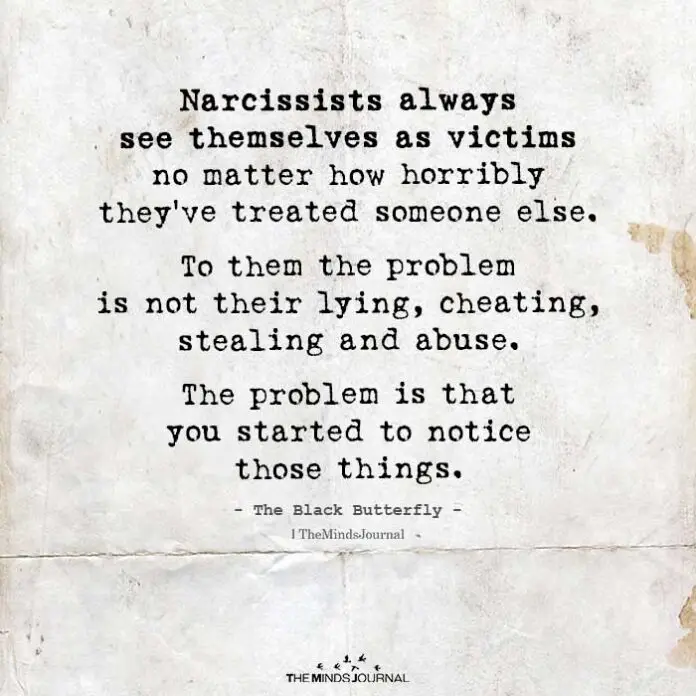
3. They only loved you when you did what THEY wanted.
Your parent/s withdrew love very easily. If you failed to do what they wanted, they would either punish you severely or give you the silent treatment. You had the impression that they only loved you when you PROVED your worth to them.
4. They liked to “get even” with you.
When you did something “wrong” or against their will — even in the smallest way — they made sure they punished you. This petty and childish way of “getting even” may have been subtle or very obvious.
For instance, they may have deliberately sabotaged something you cared about, broke something of yours, or hid something to get back at you.
5. They never respected your boundaries.
There wasn’t any “private” space to call your own growing up. Your parent/s would go through your room and private belongings, without a thought, sometimes even using what they found against you.
Related: Boundary-Busting Narcissist? How to Set Boundaries With A Narcissist
6. They competed with you.
If you ever got something nice, they took it from you, or got something nicer to “outdo” you.
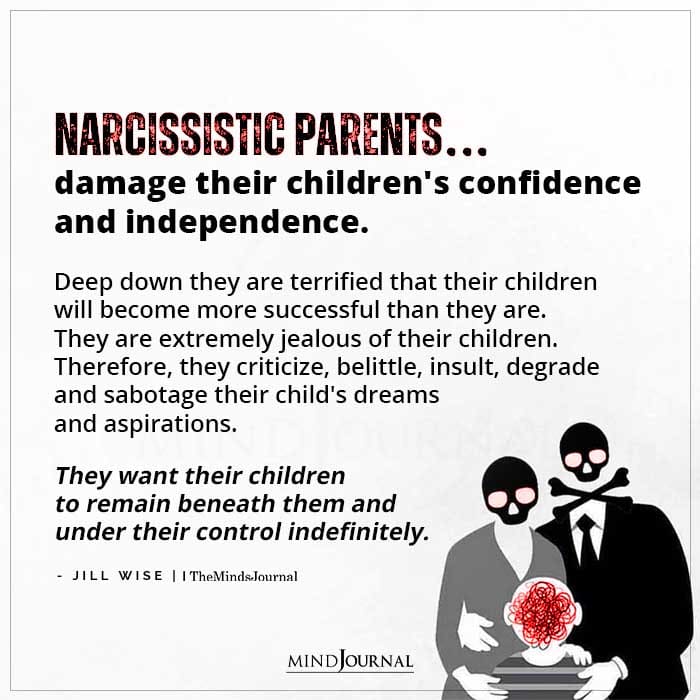
7. They “owned” your accomplishments.
Whenever someone complimented your achievements, your parent/s would instantly jump in and shift the attention to themselves.
For example, if someone congratulated you for winning a soccer trophy, your parent/s would butt in and say something along the lines of, “Yes, she gets it from me. I was always athletic as a child.” They love the spotlight and frequently stole it from you.
8. They constantly lied to you.
Your parent/s lied to manipulate, control, and take advantage of you in some way, shape, or form. You never knew what you could trust was “real” or truthful around them, or whether they were setting up a hidden trap for you to fall into.
9. They never listened to (or cared) about your feelings.
You felt that you could never share your feelings with your parent/s because they would either make fun of you or talk about themselves instead. Somehow, whatever issue you faced as a child was spun into a pity party for them, not you.
10. They constantly insulted you.
Your parent/s berated, demeaned and harassed you on a constant basis. They may have even latched onto insecurity of yours and used it to humiliate you.
11. They exerted explicit control over you.
In other words, when you didn’t obey them, they would punish you. The message was very clear, “Obey me, or I’ll punish you.” You were punished through emotional or physical abuse including emotional blackmail, hitting, or beating.
12. They gaslighted you.
In order to control you, they used a psychological manipulation tactic known as gaslighting. What this means is that they would deliberately make you feel crazy, or cause you to doubt your sanity, in order to gain the upper hand.
This led to the development of constant self-doubt during your childhood, adolescence, and present life. Read more about gaslighting.
13. They “parentified” you.
As a child, you were expected to “parent” your parent, or behave as a surrogate parent to cater for their needs, instead of them catering to yours.
14. They had a “favorite” or “golden” child.
In your family, there was the “golden” child and the “scapegoat” child. In other words, one child was seen as perfect and capable of doing no harm. The other child was seen as the black sheep and the cause of all issues (this is also known as an identified patient). These roles could have also switched frequently.
Related: The Power Of Being The Black Sheep In The Family
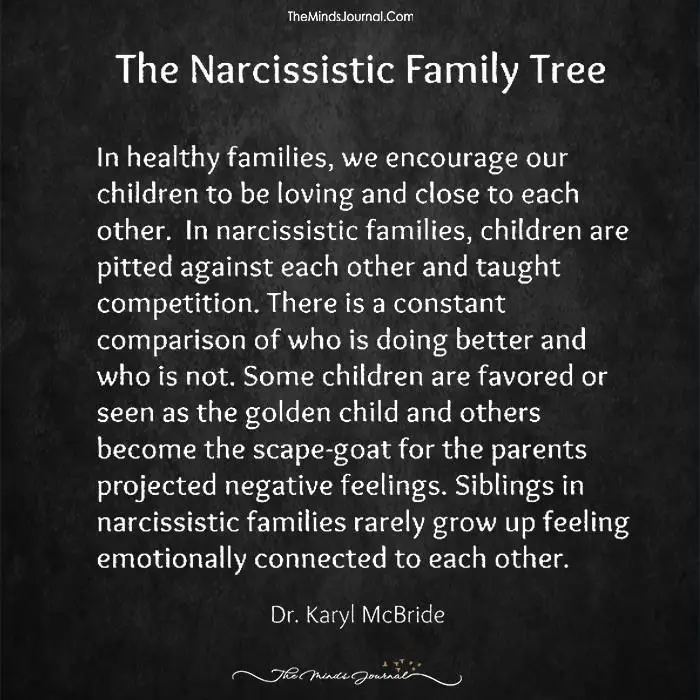
15. They reacted intensely to any form of criticism.
Did you ever criticize your mother or father? What was their general reaction? If your mother and/or father was a narcissist, they likely reacted in an extreme way. They would scream at you and likely physically hurt you through smacking, or some other method.
16. They projected their bad behavior onto you.
For example, if you were in an argument, they would hysterically scream at you, “ How dare you talk to your mother that way. Go to your room. We’ll talk after you stop screaming at me.”
17. They never displayed any empathy.
They never asked about your feelings, sympathised with you, or cared. They seemed to be solely interested in their own feelings.
18. They were infallibly correct and never wrong.
Even when they made a mistake or treated you in an unfair, or unjust way, they never apologized for their mistake. When you confronted them about it, they denied all accusations and tried to spin the blame onto you.
19. They liked to present a perfect family image to outsiders.
Your parent/s went to great lengths to ensure that others perceived you as a loving/successful/enviable family. Likely, you were very aware of this ploy but kept silent for fear of wrath from your parent/s.
How To Confirm That You’re the Child of a Narcissist
After reading through this list of symptoms you might still be unsure of how to define your parent/s. That’s normal. Your narcissistic mother and/or father wouldn’t have exhibited all of the signs above (but if they did, pay attention).
If you’re the child of a narcissist, you will likely struggle with these problems:
- Codependency in other relationships
- Weak sense of self
- Poor interpersonal boundaries and inability to say “no”
- Chronic guilt or shame
- Self-loathing
- Emptiness
- Trust issues
- Inability to express or handle emotions
- Anxiety or depression
- Being a people-pleaser
Related: Breaking Free From The Toxic Web: 9 Steps For Dealing With A Narcissist In Your Life

How Do You Deal With A Narcissistic Mother or Father?
What next?
If you’re quite sure that one, or both, of your parents, was a narcissist, it’s likely that they still have some kind of involvement in your life. Many narcissist support groups recommend cutting off contact from such parents or interacting them in small, measured ways (such as through a phone call, or text message).
To begin your process of soul healing, you might like to do the following:
- Stop hoping that your narcissistic parent will change — you can never change them.
- Allow yourself to grieve the parent you never had.
- Understand that you have been raised to suppress and deny your feelings. Now is a good opportunity to slowly open up to those years of repressed feelings. You can do this through seeking traditional psychotherapy, or alternative methods such as shamanic healing, hypnotherapy, holistic remedies, etc.
- Learn to take care of your own needs through the practice of self-love.
- Reconnect with your inner child and learn how to care for it in a way your parents never could. This is called inner child work.
- Keep an active daily journal in which you self-reflect. This will help you become more self-aware.
- Explore soul retrieval, which is a vital part of soul work.
- Express your emotions in a healthy way, particularly any anger you have inside.
- Join a support group and connect with others who have experienced similar childhood experiences. You can find many on Facebook, or you could search the internet for local groups.
Related: How Adults Can Get the Distance They Need from Toxic Families
While you may feel broken, it’s important to remember that you are not broken. Your soul can never be broken. It is still there, waiting for you to access it. This experience only serves to show you that everything you need is within you.
No matter what your childhood was like, it’s still possible to heal and reunite with that source of unconditional joy, wonder, and love inside.
Originally appeared on - LonerWolf
Frequently Asked Questions (FAQs)
How to deal with a narcissistic controlling parent?
When dealing with a controlling parent, you need to create boundaries and be clear about them. Learn to speak up for yourself once in a while when you need something.
How do you say no to a narcissistic parent?
When you have a narcissistic parent, saying “no” can be difficult. But you need to be clear and certain with them because you are entitled to your opinion.
How do you maintain a relationship with a narcissistic parent?
If you have a narcissistic parent, there are some ways you can manage your relationship with them like setting healthy boundaries, staying calm and not reacting emotionally to what they say.
Can a covert narcissist be a good parent?
Narcissists are not inherently suited to be good parents. While not all narcissists are physically abusive, they can nonetheless lead a child to have a wide range of psychological issues.
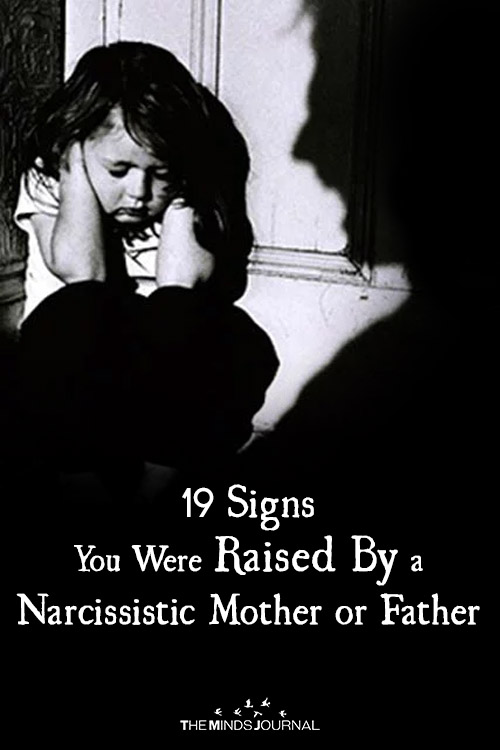
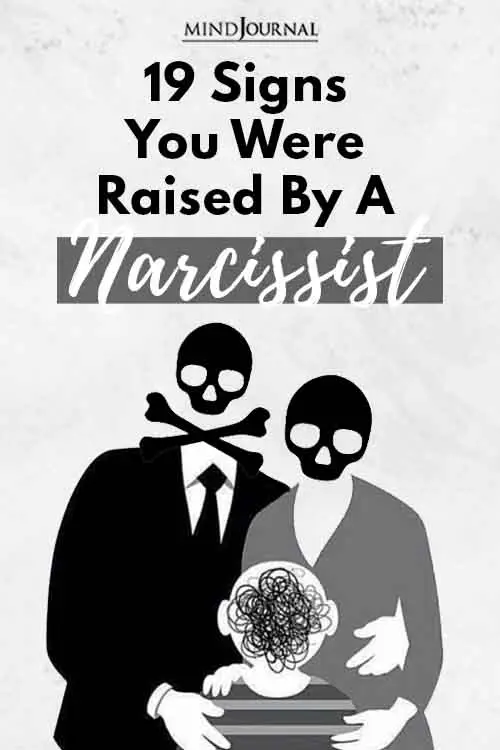
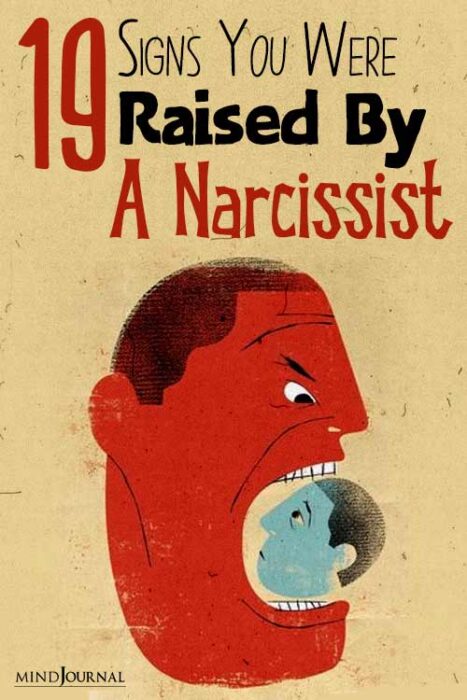

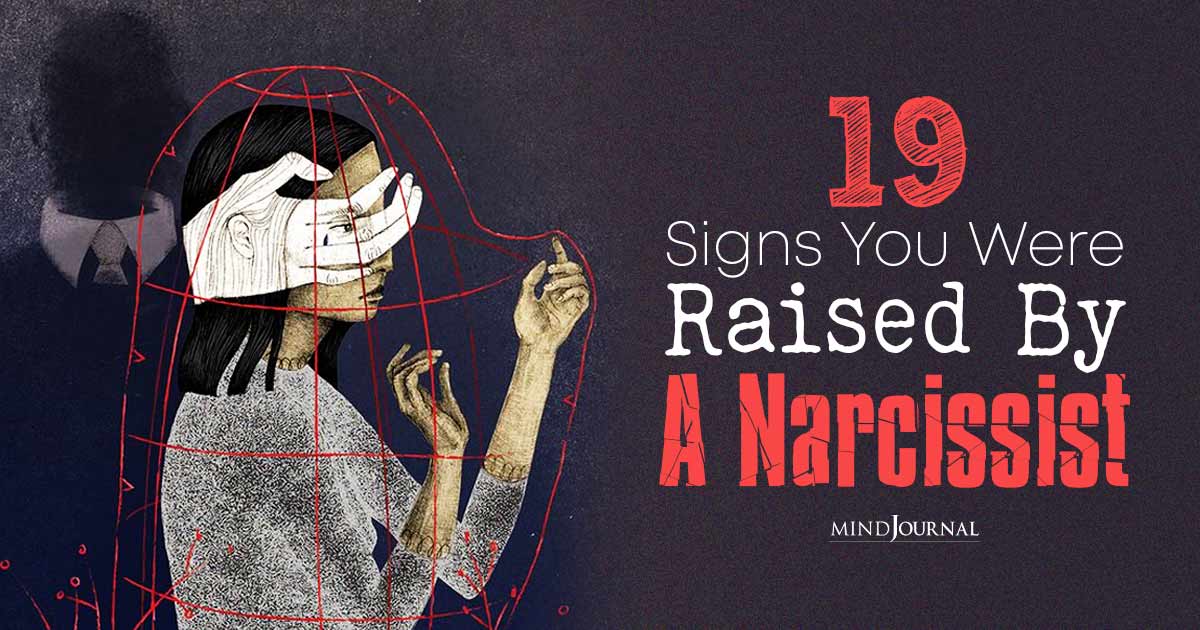







Leave a Reply
You must be logged in to post a comment.